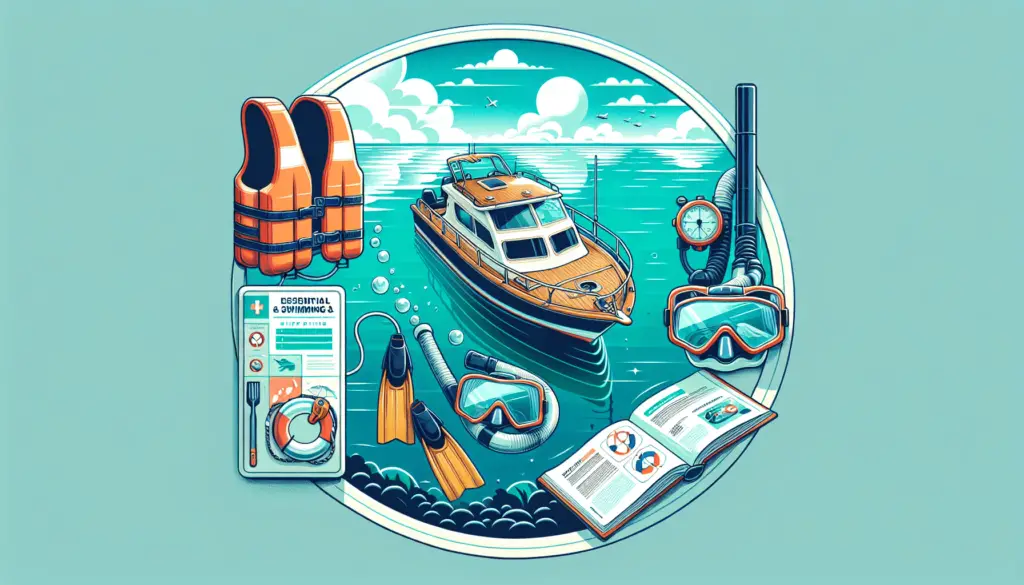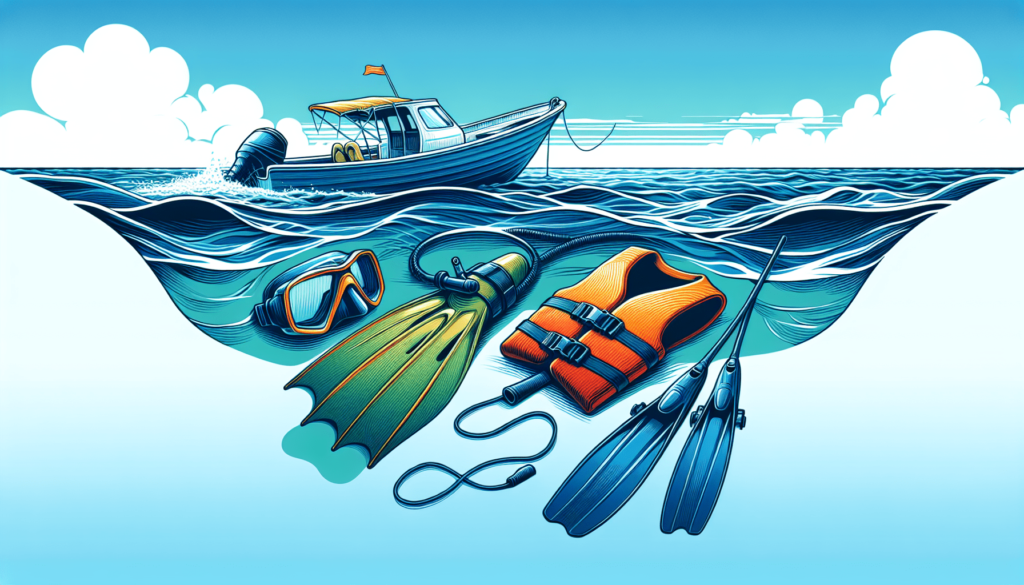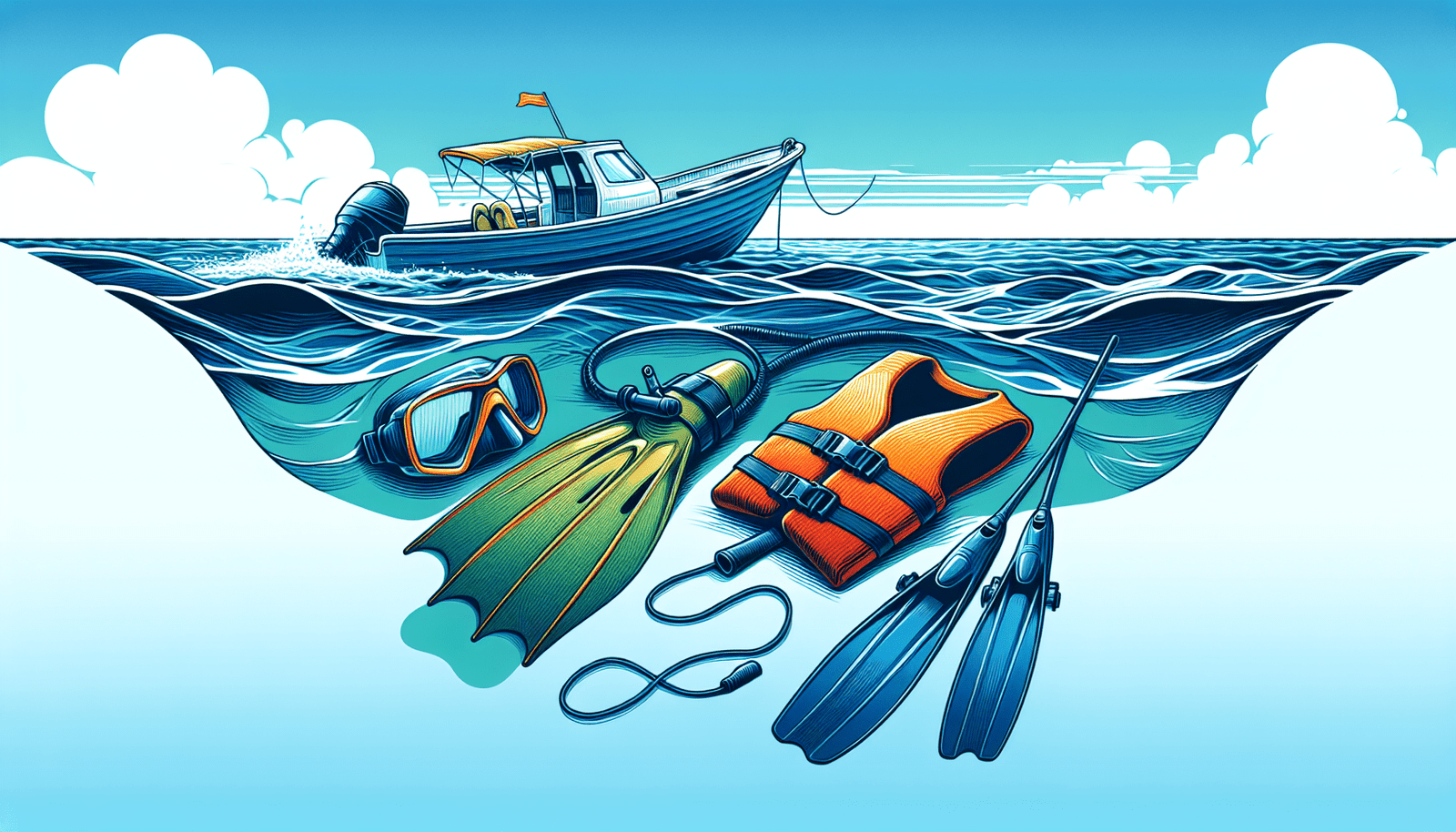Imagine painting a marvelous watercolor of consistent calm waves on a sunlit forceful sea. It’s a vista that beckons you to grab your swimsuit and diving gear to venture into the ocean’s deep and mysterious allure. In this nautical article titled “Top Boating Safety Tips For Swimmers And Divers”, your seafaring curiosity will be thoroughly catered. Drawing upon expert knowledge, it lays out invaluable safety tips that will professionally guide your water expeditions while keeping you passionately in tune with the rhythm of the sea.

Understanding the Importance of Safety Equipment
At the heart of every exhilarating boating experience is an unspoken, unwavering commitment to safety. Welcome to the exciting world of water adventures, where your well-being is your compass, guiding you along the waves and beneath the surf. In this journey, one of your staunchest allies is your safety equipment. It stands by you, braces itself against the unpredictable aquatic world, and adds a layer of certainty to your thrilling escapades.
Knowing the necessary equipment
The beauty of where the sea meets the sky can be truly breathtaking. But remember, the sea does not discriminate between a seasoned swimmer and a novice diver. You must be armed with the necessary safety gear. Life jackets and vests are your buoyant guardians, keeping you afloat should you find the strong currents challenging. helmets protect you from unexpected debris. Fins enhance your maneuverability, and masks lend you the eyes of the sea, opening up its mysteries for your own exploration.
Learning how to use the equipment
Knowing your equipment isn’t just about owning it—it’s about understanding its very soul, so to speak. It’s about knowing how to slip gracefully into your life jacket and adjusting it to support your body weight. It’s about learning to fasten your helmet securely to protect against unforeseen dangers. Every lash, every buckle and clamp is part of your survival repertoire, so treat them with respect and seek to understand their workings deeply.
Keeping equipment in good condition
Your safety equipment is your invisible, silent hero. Treat it with reverence and the attention it deserves. Regularly check for signs of wear and tear and replace any dysfunctional parts immediately. Clean them with care to prevent a build-up of salt and grime. Remember, in your hand lies the lifespan and effectiveness of your safety gear.
Checking Weather Conditions
Mirroring the mercurial emotions of mother nature, the weather is an inevitable, all-embracing force determinative of your boating journey. Before setting sail, always consult the ethereal guardian of your aquatic adventure—the weather.
Understanding aquatic weather patterns
The ocean, in its boundless breadth and depth, frequently bears the brunt of changing weather patterns. Build a foundation of understanding about the characteristic tempestuousness or tranquillity of your chosen destination. Delve into the seasonal ebbs and flows and the day-to-day variations in weather conditions.
Reading local forecast
Keep an eye on the local forecast, an indispensable tool in your safety kit. Let it be your guiding star in anticipating fast-approaching storms or rewarding calmness. Skeptical about the day’s boarding conditions? Not sure if the sky’s going to stay this clear? Call upon your dependable weather report—it seldom lets you down.
The importance of monitoring changes
The sea is a domain of constant change, and so is its affairs with the weather. So, keep your senses tuned to the slightest of its mood swings. When you are out there, riding the waves, be mindful. Did the wind get chillier? Are the clouds congregating a tad bit more than you’d like? Monitoring these minor, yet crucial changes could be the difference between a safe ride back to the shore and a however daunting situation.
Respecting Local Laws and Restrictions
Navigating the waterways should always be accompanied by a healthy respect for the rules and regulations that preserve its environmental and social integrity. So, as you make your foray into the world of boating, think of this set of laws as your code of conduct, your commitment to being a responsible citizen of the water.
Researching boating laws
Before you dive into the aquatic realms, delve into the pages of local boating laws and understand what is expected of you. While laws and restrictions will vary from one jurisdiction to another, they will generally cover aspects such as licensing requirements, age restrictions, speed limits, and obligatory equipment.
Engaging with the local boating community
Nobody understands the spirit and letter of local boating laws better than the local boating community itself. So, why not reach out? Learning from their experiences and insights, and adhering to these regulations, not only ensures safety but also enriches your boating experience.
Complying with conservation regulations
As an adventurer, it’s your responsibility to protect the very spaces which provide joy and exhilaration for many. Understanding and abiding by conservation regulations can help safeguard the aquatic environment. An integral part of this is taking care not to disturb local wildlife or affect the health of the ecosystem with reckless behavior and hazardous materials.
Significance of Boating Course
Knowledge is the greatest lifeboat. Especially in the sea of boating, where uncertainties often lurk beneath the surface, a boating course can be the beacon that guides you safely to the shore.
Learning necessary skills
Through comprehensive lessons, a boating course imparts necessary skills ranging from operating the craft and navigation to safety procedures and emergency response. With confidence instilled, not only can you better enjoy the adventure, you can also handle unanticipated hitches with deftness.
Finding appropriate classes
Finding a suitable course entails understanding your needs and what various programs provide. Look for programs that are comprehensive, focusing on practical skills along with theoretical knowledge. Also, ensure they are certified or accredited by a recognized body for an authentic learning experience.
The Benefits of Refresher Courses
Even for the seasoned swimmer or diver, a refresher course has immense value. The sea is a world of constant change, demanding a dynamic set of skills and knowledge. A refresher course can help stay updated with not just safety measures, but also advancements in equipment usage and laws.

Maintaining Boating Equipment Properly
Your boat and equipment are comrades in this voyage, banking on you for their well-being as much as you rely on them for yours.
Keeping engines and equipment clean
Saltwater, UV rays, and marine organisms can wreak havoc on your boat and equipment if left unattended. Regular cleaning can help preserve their aesthetics and functionality, hence keeping you safe in the waters.
Regular maintenance checks
Just as a racing car requires regular tune-ups to perform on the track, your boat needs consistent checking and servicing. Regular maintenance checks help ensure mechanical parts operate optimally, safety provisions are intact, and every inch of your craft remains seaworthy.
Efficient fuel practices
Efficient fuel practices such as refueling at specialized docks, ensuring airtight storage, and minimizing fuel wastage not only save costs but also contribute to environmental conservation. Remember, your fuel practices make a ripple in the canvas of marine conservation.
Safe Diving Practices
Diving beneath the waves, enveloping yourself in the ocean’s mystery, is an ethereal experience. But remember, the ocean’s health is only as bountiful as its safety.
Proper equalization
The ocean’s depth, along with its allure, carries a force that can affect your ears. Learning and practicing equalization techniques help avoid discomfort and potential damage while descending underwater.
Monitor nitrogen levels
In the world of diving, nitrogen is both friend and potential foe. Monitoring nitrogen levels in the body is crucial in preventing decompression sickness—a condition that can occur when a diver ascends too quickly to the surface.
Safety stops
A safety stop—a practice of pausing for several minutes at a certain depth while ascending—allows gradual depressurization and helps mitigate the risk of decompression sickness. It’s one of the golden rules of diving, guaranteeing you step back on board unharmed, brimming with the ocean’s tales-beneath.
Having a Coping Strategy for Currents
Currents are the sea’s own pathways. They can provide an exhilarating ride, or, without adequate preparation—a challenge.
Recognizing various types of currents
Currents can vary in strength, depth, and direction. From the gentle push of surface currents to the formidable pull of rip currents, your safety lies in recognizing them correctly and understanding their potential impact.
Swimming techniques for specific currents
Each current, with its unique persona, calls for a unique approach. For instance, escaping a rip current often involves swimming parallel to the shore, while dealing with surface currents could require adjusting your swimming strength and direction. Learn these strategies, for they are your keys to navigating the waterways safely.
Equipment designed for strong currents
Certain safety equipment is specifically designed to combat strong currents. Selecting the correct flippers, harnessing the support of buoys, or having a safety line are some of the ways you can enhance your sailing comfort and confidence.
Keeping a Lookout for Maritime Traffic
In the grand theatre of the sea, you are not the sole actor. Sharing this stage are other vessels—big and small—and being mindful of them is paramount to ensuring a safe journey.
Understanding maritime rules
Maritime traffic laws, or the ‘rules of the road,’ guide the conduct of vessels around each other. Understanding these rules is the first step toward preventing collisions and close-quarter situations.
Communicating with other vessels
Communication is key in the vast expanses of the ocean. Be it flag signals, sound signals, or radio communications, learning the dialect of the sea helps you state your intentions to other vessels, and understand theirs.
Navigating around large vessels
Co-existing peacefully with large ships requires exercising good judgement and proper navigational skills. Keep a safe distance, always stay visible, and predict ship movements by observing their navigational signals.
Preparing Boating Plan
The unpredictability of the ocean underscores the importance of being prepared. Planning your boating excursion not only ensures a smooth journey but can also be critical in unforeseen circumstances.
Setting a destination
Setting a clear destination aids in navigation and allows for suitable provisions to be made. Whether your destination is marked by a brooding island or a generous reef, its knowledge is the first step in your quest.
Sharing your plans
Ensure someone back on the land—a friend, family member, or the local authorities—knows about your trip. Furnish them with details such as the schedule, route, and return time, providing them with vital information should any mishap occur.
Planning for emergencies
Remember, the sea, in its grandeur and beauty, can also be unpredictable. Planning vigilantly for emergencies by equipping yourself with first aid, emergency signals, and survival gear can make a vital difference in your safety.
Communications While at Sea
In the realm of the sea, distances can increase and become deceptive. Maintaining effective communication tools can bridge this gap, ensuring help and advice are within reach.
Familiarizing with marine radio protocols
Marine radios are your vocal cords in the sea, helping you broadcast distress signals, share information, or receive weather updates. Understanding their operating protocols, including the correct distress procedures, can assist in emergency situations.
Using GPS and satellite phones
GPS systems and satellite phones are tools of precision and reliability in the vast, shifting vistas of the ocean. They offer accurate positions, navigation assistance and often a communication lifeline when cellular networks are unattainable.
The importance of signaling devices
A mirror to catch the sunlight, high-visibility flare, or an audible device like a horn or whistle, could be the small difference-maker in scenarios where visibility is limited or when reaching out to great distances. So, when you’re checking your gear, ensure these tiny heroes aren’t left behind.
In the end, your journey into the captivating world of boating, diving, and swimming becomes a medley of joy, thrill, gratitude, and mindfulness when safety secures your harness. Let these tips anchor your ride into the tides, steering you through an experience that is as safe as it is exhilarating.

